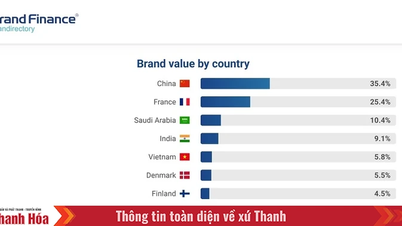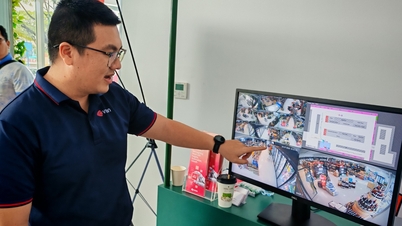GĐXH - We've all heard of IQ (intelligence quotient) and EQ (emotional quotient), but there are three other extremely important indicators that you may not know about to equip your child with.
What do any parents want for their children? Smart, confident, sharp or able to overcome difficulties?
While parents invest a lot of time (and money) in their children's education, one thing they often overlook is teaching them how to be emotionally resilient, strong, and able to weather storms or tackle challenges beyond the textbooks.
For a long time, people believed that high IQ (intelligence quotient) was the only measure of success. However, the truth is not so, a person needs IQ (intelligence quotient), EQ (emotional quotient), SQ (social quotient), AQ (adversity quotient), CQ - cultural quotient.

The number one predictor of a person's success in a borderless world is not their IQ, resume, or expertise, but their CQ. Illustration photo
What is CQ index?
In his book Cultural Intelligence Differences: Mastering the One Skill You Can't Live Without in Today's Global Economy , author David Livermore writes that the number one predictor of a person's success in a borderless world is not their IQ, resume, or expertise, but their CQ.
CQ is simply understood as "the ability to operate effectively in a variety of cultural contexts including national, ethnic, organizational, and generational."
Research conducted over the past decade shows that people with high CQ are able to adapt and thrive in a complex global society.
In a meta-analysis of a combined sample of 44,155 individuals, researchers Thomas Rockstuhl from Nanyang Technological University in Singapore and Lynn Van Dine from Michigan State University found that having CQ was consistently associated with cross-cultural effectiveness.
Culturally intelligent people are not experts in specific cultures. Instead, they possess a range of qualities that enable them to plan cross-cultural collaborations and demonstrate appropriate behavior in any cultural setting, even unfamiliar ones.
Elaine Wilson, an elementary school teacher in Belton, USA, who spent part of her childhood in Japan, Morocco and Thailand, feels that being aware of other cultures can make a difference for children and adults alike.
Compared to previous generations, children today need a unique set of skills to succeed in a diverse “global village.” And it is essential that parents and caregivers focus on enhancing their children’s cultural intelligence.
Specifically, the four aspects of CQ are:
Orientation: Motivation and confidence to overcome cultural differences and work with people from other cultures.
Knowledge: Complex and nuanced knowledge structures about similarities and differences between cultures.
Strategy: Planning and cultural awareness before, during, and after cross-cultural encounters.
Action: Flexibly change behavior to act appropriately in cross-cultural situations.
AQ - adversity quotient
AQ stands for Adversity Quotient, which is a measure devised by a group of scientists to see how an individual reacts or handles when faced with difficult challenges in life.
To raise strong, intelligent, emotionally resilient children, it is important not only to have a high IQ but also to ensure that their AQ is strong. Both are equally important.
Coping with adversity and being resilient in the face of difficulties is an essential life skill that parents need to teach their children from an early age. A child with a strong AQ will prevent the onset of mental health problems.
There are also claims that strong AQ can lead to increased productivity, energy, performance, and improved mental health.
AQ is not suitable for all ages. While parents cannot force their children to take on challenges at a young age, it is important to ensure that they know how to deal with difficult situations, or be prepared for bad things to happen to them.
Experts also say that it is important to teach and make children learn how to deal with adversity so that they can prepare for the future ahead. Life events can happen at any time, the best way is to teach children to prepare mentally to deal with them.
Emotionally resilient children are also better able to handle trauma and are less likely to feel deprived as adults.
It is important to learn how to cope with adversity in life. According to Emmy Werner, a scientist and expert in human behavior, children with a strong AQ possess the following characteristics:
- Be active, eager to learn, ready to solve problems in life.
- Solve problems in a constructive way, give feedback and learn from experiences.
- Don't give up easily when you fail.
- Maintain faith and have a positive attitude.

The most important factor for career advancement that millions of people are forgetting is social intelligence SQ (Social Intelligence Quotient). Illustration photo
SQ - social index
Every parent wants their child to be smart, talented, and to become a dragon or a phoenix in the future. Therefore, many parents focus on investing in their children's education in the following three groups of indexes: Intelligence Quotient - IQ, Emotional Intelligence Quotient - EQ, and Adversity Quotient - AQ. They do not hesitate to spend money to register their children for extra classes, art classes, or to buy modern learning equipment for their children to develop comprehensively.
However, many children, despite being carefully trained, do not grow up as expected. Many children who have excellent academic records in childhood but do not grow up to be successful.
Even many children, because they cannot overcome the glorious shadow of their past, lead to inferiority complex, self-pity, and withdrawn life.
This situation raises the question, are parents educating their children in the wrong direction, focusing on IQ, EQ and AQ while ignoring many other important skills?
According to statistics from employment agencies, tens of thousands of employees have lost their jobs due to poor social communication skills. Before that, these people always thought they met the criteria and completed the assigned tasks well.
In the new era, there are hundreds of thousands of jobs from extremely simple to extremely complex. But the most important factor to get ahead in work that millions of people are forgetting is social intelligence SQ (Social Intelligence Quotient).
Children with strong EQ possess the following characteristics:
Good communication skills
If a child has the ability to make friends quickly, is open to conversation, and is willing to share everything with others, this is the first sign that the child possesses SEQ social intelligence.
Such children always stand in the center and always spread positive energy to everyone around. They easily carry out dialogues with many people. They are very skillful in using words and body language to create the most attractive expression.
Understanding social rules
Children who understand social rules are able to control their personal emotions and always cultivate new social knowledge to adjust their behavioral skills with people around them. These children are very skillful, delicate, and wise.
Simple social rules for a child such as: Knowing how to queue in crowded places, knowing how to protect the environment, not causing disorder in public places, etc.
Ability to listen to others
Those who receive trust are the most solid spiritual support to create a sense of safety and peace for everyone around.
Children with good listening skills can be considered the social backbone that connects everyone together.
Good adaptability
Good improvisation is a great ability of SEQ. If parents see that their child has the ability to improvise effectively, they can live well in all situations, even the most difficult ones.
This is a sign that when grown up, children will become confident in themselves and live in harmony with everyone.
These children often know how to calm down angry people or bring happiness to those in trouble. They are excellent managers and leaders in the future.
Source: https://giadinh.suckhoedoisong.vn/khong-phai-eq-iq-day-moi-la-3-chi-so-giup-con-vuot-qua-song-gio-cuoc-doi-lon-len-co-su-nghiep-thanh-cong-17224121315560207.htm




![[Photo] Party Committees of Central Party agencies summarize the implementation of Resolution No. 18-NQ/TW and the direction of the Party Congress](https://vphoto.vietnam.vn/thumb/1200x675/vietnam/resource/IMAGE/2025/10/27/1761545645968_ndo_br_1-jpg.webp)







































































































Comment (0)